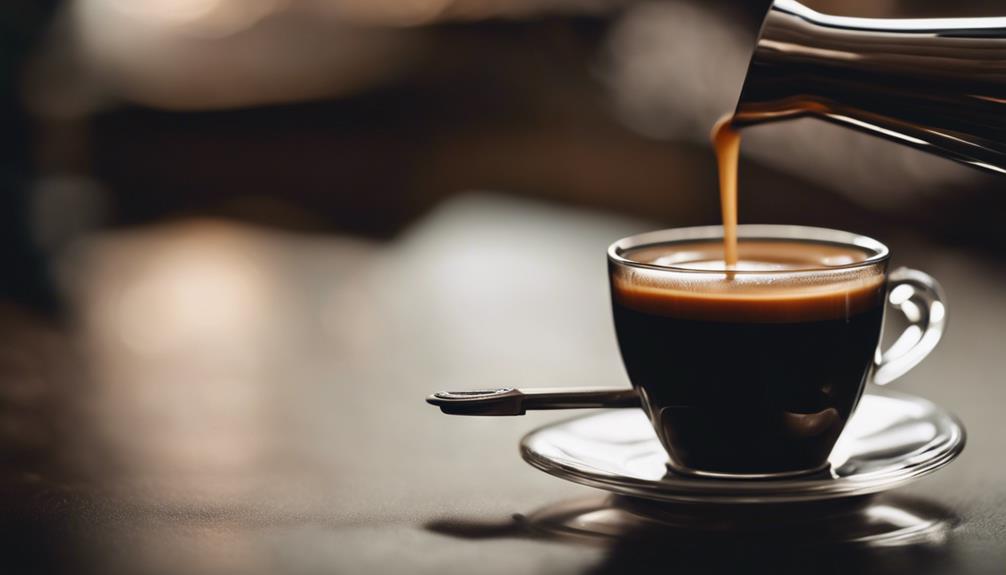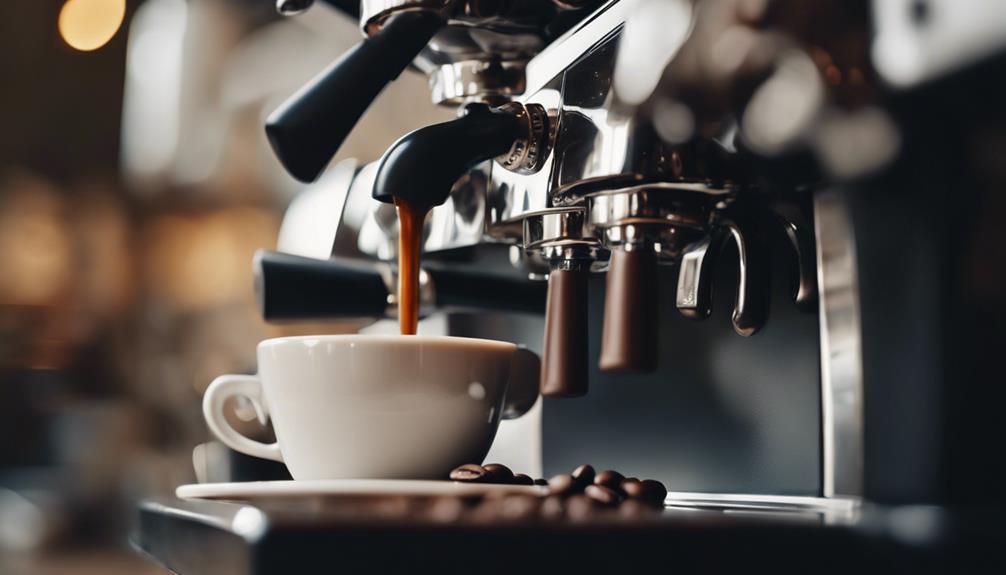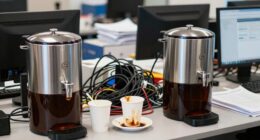If your espresso has a bitter taste, it could be due to factors such as over-extraction, dark roasts, or poor quality beans. Over-extraction can result in a lingering bitterness, influenced by grind size and tamping pressure. Water temperature is crucial; aim for 195-205°F to prevent bitterness. The type and freshness of the beans also play a significant role, with Arabica beans and fresher roasts delivering better flavor. To avoid bitterness, adjust grind size, tamp correctly, and use high-quality beans. Consistent tamping, even grounds distribution, and avoiding over-extraction are also helpful. Balancing extraction time, grind size, and water temperature can improve the flavor profile of your espresso. For more tips on enhancing your espresso taste, there are additional insights available.
Key Takeaways
- Over-extraction from fine grind size can cause lingering bitterness.
- Poor quality or stale beans contribute to a bitter taste.
- Incorrect water temperature, above 200°F, can lead to bitterness.
- Darker roasts can intensify bitterness in espresso.
- Inconsistent tamping pressure affects extraction, resulting in bitterness.
Factors Contributing to Bitter Espresso Taste
Over-extraction and improper brewing ratios are key contributors to the bitter taste often found in espresso. When brewing espresso, the water-to-coffee ratio plays an important role in determining the final taste. Using too much water can lead to over-extraction, where the flavors are pulled excessively from the coffee grounds, resulting in bitterness.
Additionally, the roast level of the beans can impact the taste of espresso. Darker roasts tend to have a more pronounced bitter flavor profile compared to lighter roasts. Furthermore, the quality and freshness of the beans are essential. Low-quality or stale coffee beans can intensify the bitterness in espresso.
Additionally, inconsistencies in tamping pressure and grind size can also contribute to the bitter taste. Ensuring a uniform and proper grind size, along with consistent tamping, can help mitigate the bitterness in your espresso.
Impact of Over-Extraction on Flavor
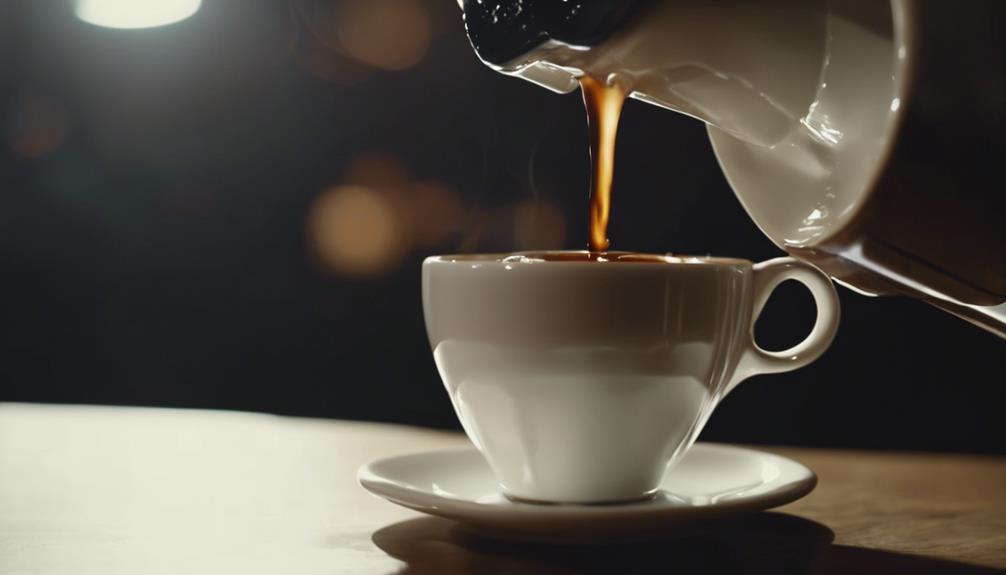
When water lingers too long with coffee grounds, it extracts excessive bitterness, affecting the flavor of your espresso.
Over-extraction occurs when the fine grind size or tightly packed grounds lead to prolonged brewing times, high water temperatures, and insufficient tamping pressure. These factors intensify the bitter taste in your espresso, disrupting the intended flavor profile.
To guarantee proper tamping pressure is around 30lbs and adjust variables like grind size, brewing time, and water temperature accordingly. Fine-tuning these elements allows you to control the extraction process, resulting in a balanced flavor profile without the overwhelming bitterness.
By mastering these techniques, you can enjoy a well-rounded espresso that highlights the intricate flavors of the coffee beans without being overshadowed by excessive bitterness.
Role of Water Temperature in Bitterness
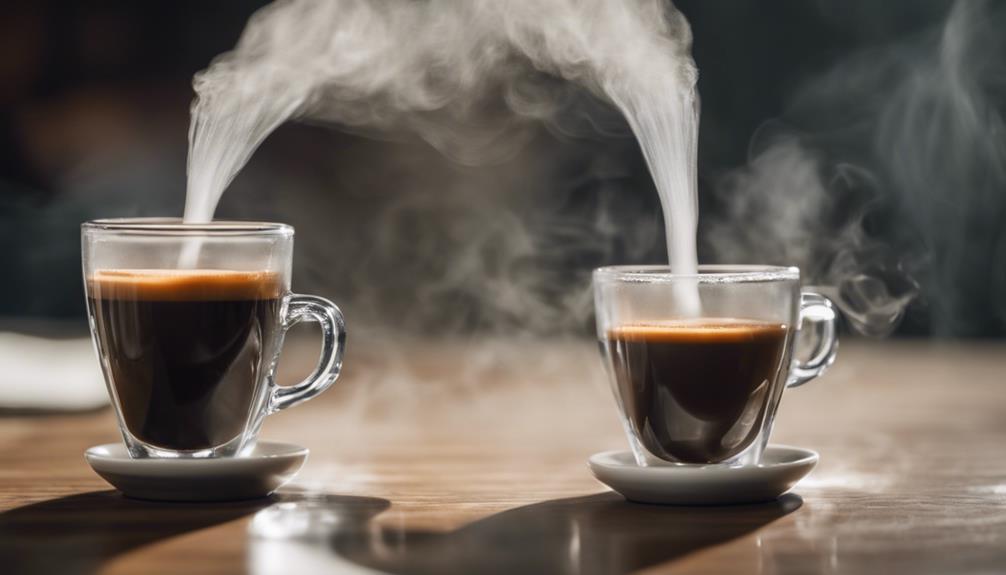
Water temperature is a critical factor influencing the taste of your espresso. Incorrect temperatures can result in bitterness due to poor extraction.
Achieving the ideal temperature range of 195°F to 205°F is key to extracting flavors without the unpleasant bitterness.
Impact of Heat
Maintaining the ideal water temperature range of 195-205°F is essential in preventing bitterness and achieving a balanced extraction in espresso. When water is too hot, above 200°F, it can over-extract the coffee, resulting in a bitter taste that may not be pleasant.
This bitterness can be intensified when scalding hot water interacts with the coffee beans, causing them to release harsh compounds that contribute to the undesirable flavor. Proper water temperature control is vital to avoid bitterness in espresso.
The sweet spot for brewing espresso is around 195-205°F, ensuring that the extraction process is optimized without extracting too many bitter compounds from the coffee grounds. Consistent maintenance of water temperature throughout the brewing process is key to controlling bitterness and enhancing the overall flavor profile of your espresso.
Water Quality Effect
To further understand the impact of water quality on espresso bitterness, consider how different water compositions can influence the taste of your brew.
Water temperature is a critical factor in determining the bitterness of your espresso. Higher temperatures can often result in a more pronounced bitterness, while the ideal water temperature for brewing espresso falls within the range of 195-205°F to avoid excessive bitterness.
Using hard water, which contains high mineral content, can intensify bitterness in your espresso, altering the final taste of your shot.
Consistent water quality and temperature control are key to preventing unwanted bitterness in your espresso shots. Utilizing proper water filtration systems can help reduce mineral content and potential bitterness, ensuring a more balanced and enjoyable espresso experience.
Extraction Duration Influence
Achieving a balanced espresso taste relies heavily on the precise control of water temperature during the extraction process. Water temperature plays a critical role in influencing the extraction duration, impacting the flavors present in your espresso shot.
Higher water temperatures can expedite the extraction process, potentially leading to over-extraction and a bitter taste. Conversely, lower water temperatures may prolong extraction, resulting in under-extracted flavors that can bring sourness to your espresso.
To avoid bitterness and maintain the water temperature within the range of 195-205°F (90-96°C) is essential. Consistent monitoring and control of the water temperature throughout the brewing process are key in regulating the extraction duration.
Influence of Coffee Bean Quality

High-quality coffee beans play a pivotal role in determining the bitterness level of your espresso. When it comes to influencing the bitterness of your brew, factors such as the type of coffee beans, roast level, and freshness are important.
Consider the following:
- Type of Beans: Opt for specialty Arabica beans over Robusta beans to potentially reduce bitterness in your espresso.
- Roast Level: The degree of roasting can impact bitterness, with dark roasts intensifying it more than light or medium roasts.
- Sourcing and Freshness: Make sure you source fresh beans from reputable roasters. Freshness and sourcing directly affect the taste and bitterness of your espresso.
How to Avoid Bitter Espresso
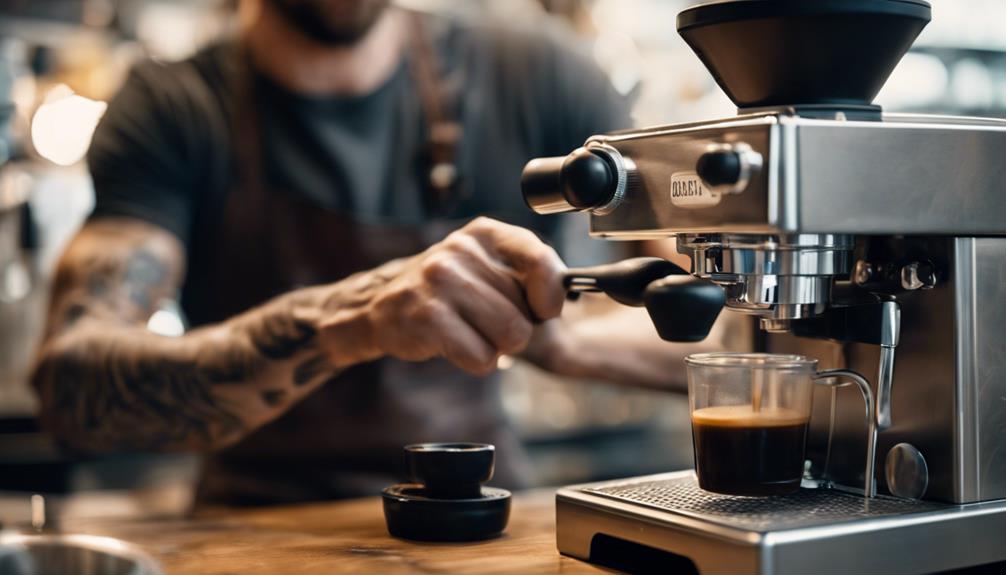
Adjusting the grind size of your coffee beans can help prevent over-extraction and the resulting bitterness in your espresso. When the grind is too fine, it can lead to over-extraction, extracting more bitter compounds from the coffee. Conversely, a coarse grind may result in under-extraction, leaving behind sour flavors.
Properly tamping the coffee grounds is essential for ensuring even extraction. Uneven tamping can cause water to flow through the grounds unequally, leading to a bitter taste in your espresso.
To further avoid bitterness in your espresso, use fresh, high-quality beans. Stale beans can produce a flat and bitter taste. Keep an eye on the water temperature as well; water that's too hot can extract undesirable bitter flavors.
Experiment with different brewing ratios to find the right balance between flavors and avoid bitterness. By paying attention to grind size, tamping, bean quality, water temperature, and brewing ratios, you can achieve a balanced and flavorful espresso shot.
Solutions for Bitter Espresso Taste
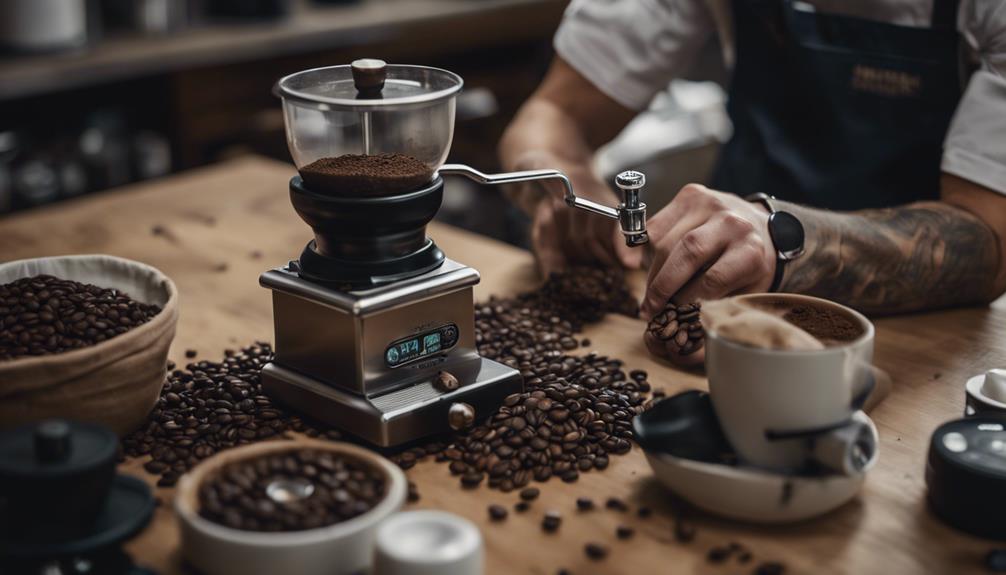
To reduce the bitter taste in your espresso, consider adjusting the grind size to be coarser for a smoother flavor profile. Additionally, using fresher coffee beans and maintaining proper storage conditions can help prevent bitterness in your espresso.
Checking and adjusting the water temperature is vital as it greatly impacts the taste of your espresso. Moreover, mastering the proper tamping technique, ensuring consistent pressure, is essential to avoid bitterness in your espresso shots.
Over-extraction, caused by prolonged brewing time, can also lead to a bitter taste in your espresso.
- Using fresher coffee beans can make a noticeable difference in the bitterness of your espresso.
- Adjusting the water temperature can be the key to achieving a balanced and less bitter espresso flavor.
- Perfecting your tamping technique is a skill that can greatly enhance the overall taste of your espresso.
Preventing Bitterness in Espresso Shots
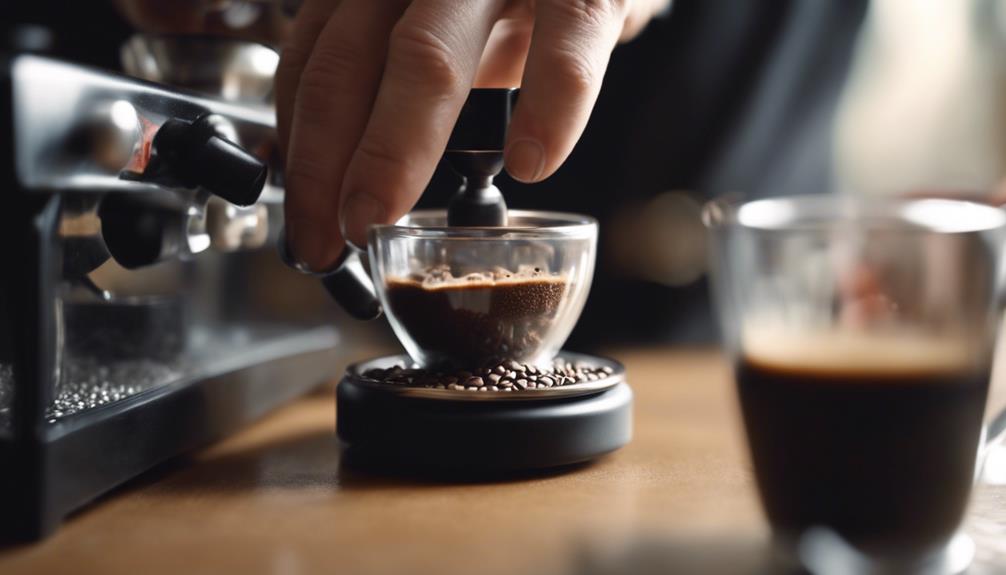
Prevent bitterness in your espresso shots by ensuring consistent tamping pressure and even distribution of coffee grounds. Inconsistent tamping pressure can lead to uneven extraction, resulting in a bitter taste. Additionally, over-extraction, where too many compounds are extracted from the coffee grounds, can contribute to bitterness. To avoid this, focus on using the right grind setting on your espresso grinder. Adjusting the grind setting helps achieve the best extraction level, preventing bitterness in your shots.
Using high-quality beans is essential in enhancing the flavor profile of your espresso and reducing bitterness. Fresh, high-quality beans can offer a smoother taste experience.
Furthermore, pay attention to water temperature and extraction time. Proper brewing parameters, such as maintaining the correct water temperature and controlling the extraction time, play a significant role in preventing bitterness.
Adjusting Brewing Parameters for Better Taste
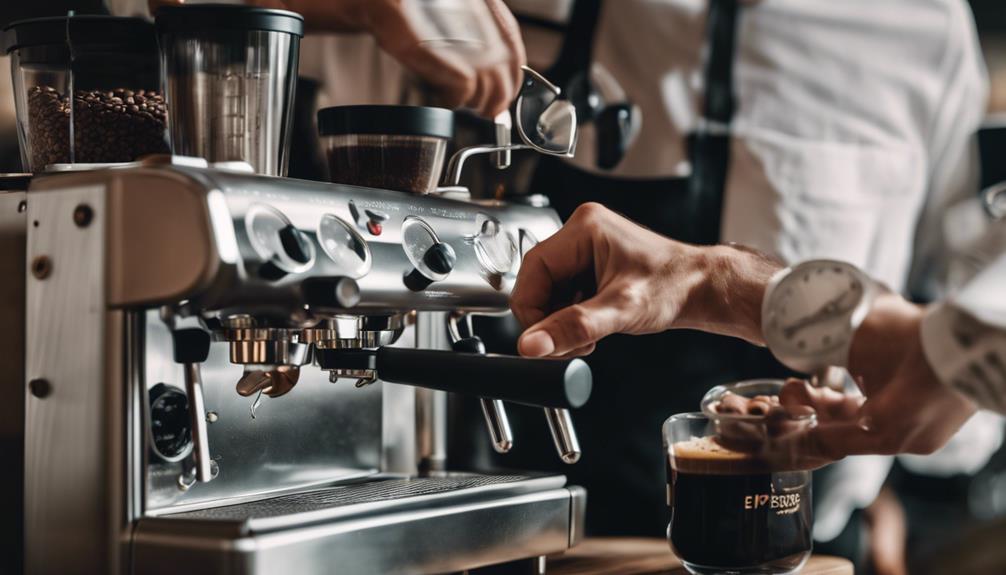
Achieving a better taste in your espresso involves fine-tuning brewing parameters to enhance flavor and minimize bitterness. To improve the taste of your espresso, consider the following adjustments:
- Adjust Your Grind: Experiment with different grind sizes to find the best one that balances extraction time and flavor. Finer grounds can lead to over-extraction, resulting in a bitter taste.
- Proper Tamping Technique: Make sure you tamp the coffee grounds evenly and with the right amount of pressure. Proper tamping helps in achieving consistent extraction, preventing bitterness in your espresso shots.
- Control Water Temperature: Monitor the water temperature closely as excessively high temperatures can lead to a burnt flavor. Adjusting the water temperature can have a significant impact on the overall taste of your espresso.
Enhancing Espresso Flavor Profile
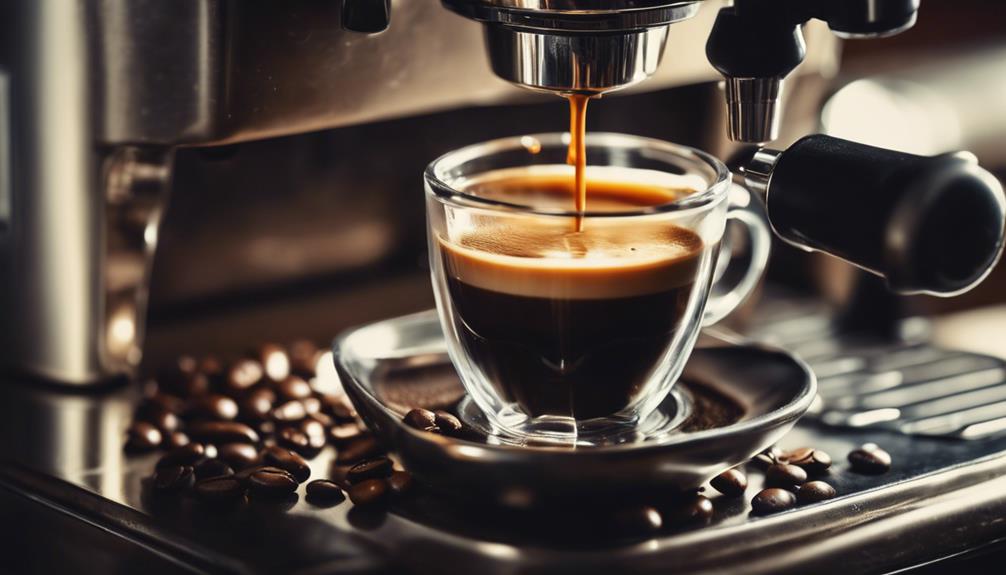
Enhancing the flavor profile of your espresso involves a delicate balance between extracting solids from the ground coffee and utilizing the right amount of water.
The bitterness in espresso can be affected by factors such as over-extraction, improper brew ratios, and the roast level of the beans.
To enhance the taste of your espresso, it's important to pay attention to the water amount used during brewing. Insufficient water can lead to a sour taste, while using too much water can result in bitterness.
Achieving the correct water amount through volumetric programming is key to balancing the flavors in your espresso shot.
Additionally, the grind size of the coffee beans plays a significant role in the extraction process and ultimately impacts the overall flavor profile of your espresso.
Frequently Asked Questions
Is Espresso Supposed to Taste Bitter?
Espresso isn't meant to taste overly bitter. It should offer a well-rounded flavor with hints of sweetness, acidity, and bitterness.
The bitterness in espresso comes from compounds like caffeine and tannins, adding complexity. To avoid excessive bitterness, use proper extraction methods like adjusting grind size, water temperature, and brew time.
Over-extraction, extracting too much from the grounds, can lead to a bitter flavor. Quality beans, fresh grinding, and precise brewing can help achieve a balanced espresso.
How to Make Espresso Taste Good?
To make espresso taste good, start by ensuring a proper extraction balance through adjusting grind size and tamping pressure.
Freshly roasted and ground coffee beans can enhance flavor. Control water temperature and brew ratio to prevent bitterness from over-extraction.
Regular equipment maintenance is key to avoiding rancid flavors. Experiment with different coffee beans and roast levels for a balanced taste.
Why Does My Espresso Have a Weird Aftertaste?
If your espresso has a weird aftertaste, various factors could be at play. Over-extraction, unclean equipment, or low-quality beans may contribute.
Inconsistent brewing parameters, like water temperature, can also affect taste. Consider water quality, bean storage, and ground freshness.
Address these variables to refine the flavor of your espresso and achieve a more satisfying taste experience.
How Do You Fix the Taste of Espresso?
To fix the taste of espresso, start by adjusting grinder settings for coarser grounds and ensuring proper tamping pressure around 30lbs. Aim for a shot time of 20-30 seconds to avoid bitterness. Different beans may require specific grinder settings for best extraction.
Prevent burnt flavors by avoiding overheating during brewing. By mastering these techniques, you can enhance the flavor profile of your espresso and enjoy a more balanced and enjoyable cup.
Can Decaf Espresso Still Taste Bitter?
Yes, even a decaf espresso can still taste bitter. While the process of removing caffeine from coffee beans can alter the flavor profile, the bitterness from the natural compounds in coffee still remains. So, a shaken espresso sans caffeine may still have that familiar bitter taste.
What Causes the Bitter Taste in Espresso?
Understanding bitter espresso flavors is essential for coffee enthusiasts. Several factors can contribute to the bitter taste in espresso, including over-extraction, burnt coffee grounds, or an improper brewing temperature. Achieving the perfect balance of flavors is crucial for a smooth and enjoyable espresso experience.
Conclusion
To sum up, bitter espresso can result from factors such as over-extraction, water temperature, and bean quality.
To avoid bitterness, adjust brewing parameters and focus on enhancing the flavor profile.
By paying attention to these key elements, you can enjoy a more balanced and satisfying espresso experience.
Remember, the perfect shot of espresso is a delicate balance of precision and quality ingredients.
